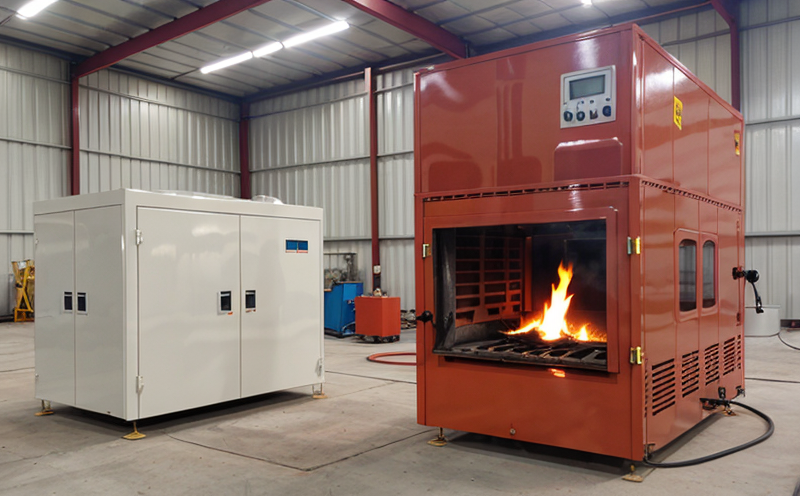ASTM E793 Enthalpy of Fusion by DSC
The ASTM E793 standard method is a critical tool used to measure the enthalpy of fusion of crystalline materials. This test is particularly useful for characterizing polymers, metals, and alloys that exhibit a clear melting transition when heated. The primary focus of this service is on determining how much energy (in joules per gram) is required to melt one gram of a substance at its melting point.
The Differential Scanning Calorimetry (DSC) technique is employed in ASTM E793. During the test, a sample and an empty reference crucible are heated at a constant rate while their temperatures are measured continuously. The difference between the heat flows to the sample and the reference is monitored as a function of temperature.
The enthalpy of fusion can be calculated from the area under the heat flow curve during the melting process. This test provides detailed insights into the crystalline structure, purity, and molecular weight distribution of materials. It’s widely used in quality control to ensure uniformity across batches and in research and development for material characterization.
For accurate results, proper sample preparation is crucial. The sample should be homogeneous with no visible impurities that could affect the melting process. Commonly tested materials include polyethylene, polystyrene, and certain metals like copper or aluminum.
The DSC instrument used in this service must adhere to international standards such as ASTM E793. This ensures consistency and reliability across tests performed by different laboratories around the world. The equipment is calibrated regularly using certified reference materials provided by organizations like NIST (National Institute of Standards and Technology).
ASTM E793 also specifies that samples should be heated at a controlled rate, typically 10°C per minute, to ensure consistent results. The melting point of the sample is determined from the peak temperature during the test.
The data generated by this service can help in various applications including pharmaceuticals where it aids in understanding the polymorphic changes of active ingredients; electronics manufacturing where it assists in selecting appropriate solder materials; and aerospace engineering where it contributes to optimizing fuel tank designs.
In summary, ASTM E793 Enthalpy of Fusion testing is a vital method for material scientists and quality assurance professionals. It provides detailed information about the thermodynamic properties of crystalline materials which can be leveraged across numerous industries from pharmaceuticals to aerospace.
- Ensures uniformity in production batches
- Supports research into new materials
- Aids in selecting suitable materials for specific applications
- Facilitates quality control checks
Eurolab Advantages
EuroLab offers a range of services that are designed to meet the highest standards set by international regulations. Our expertise in ASTM E793 Enthalpy of Fusion testing is complemented by years of experience and cutting-edge technology.
We provide unparalleled accuracy and precision, ensuring reliable results every time. Our highly skilled team of scientists and engineers uses state-of-the-art DSC instruments that are regularly calibrated to ensure they meet the stringent requirements laid out in ASTM E793.
Our commitment to quality extends beyond just the technical aspects. We offer comprehensive training programs for our clients, helping them understand the nuances of this testing method so they can interpret results effectively. Additionally, we maintain strict adherence to confidentiality agreements ensuring that all information shared remains secure and confidential.
EuroLab’s robust infrastructure supports efficient turnaround times without compromising on quality. Whether you need routine checks or one-off assessments, our dedicated team will ensure your project is handled promptly and professionally.
Our clients benefit from access to the latest developments in thermal analysis technology through our ongoing research collaborations with leading academic institutions worldwide. This ensures that we stay at the forefront of innovation within this field.
Quality and Reliability Assurance
The quality and reliability assurance process at EuroLab is stringent and comprehensive. Our DSC instruments are regularly calibrated using reference materials provided by NIST, ensuring that all tests performed meet the highest standards set by ASTM E793.
- Regular calibration of instruments to ensure accuracy
- Use of certified reference materials for calibration purposes
- Strict adherence to ASTM E793 protocols
- Comprehensive training programs for clients on interpreting results
- Confidentiality agreements in place to protect client data
We continuously monitor our processes and equipment performance to maintain the highest level of quality. This includes regular audits and feedback loops from our team members, ensuring that every aspect of our service is optimized for excellence.
Environmental and Sustainability Contributions
EuroLab actively contributes towards environmental sustainability through its commitment to reducing waste and energy consumption. By offering precise ASTM E793 tests, we help clients minimize material usage during development stages by providing accurate data early in the process.
We also encourage our clients to adopt sustainable practices throughout their operations. For instance, we recommend recycling unused samples after testing rather than disposing of them as waste. This approach not only reduces environmental impact but also promotes resource efficiency within industries.
Moreover, EuroLab supports sustainability initiatives by supporting research projects aimed at developing greener manufacturing processes and materials. Through collaboration with academic partners, we strive to contribute positively towards global efforts in reducing carbon footprints across various sectors.





